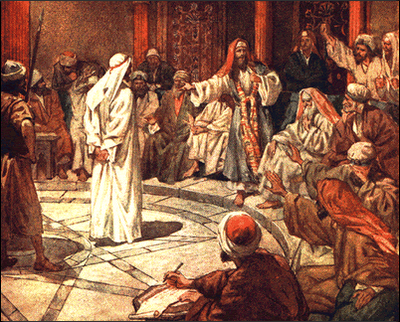Simeon Blesses the Child
Illustration from The Children's Friend - Part 1
TODAY’S SPECIAL: Luke 1:39-56
TO CHEW ON: “‘Blessed is she who believed, for there will be a fulfillment of those things, which were told her from the Lord’” - Luke 1:45
The writer of my Bible’s notes makes this observation about the time around Jesus’ birth:
“Note in chapters 1 and 2 (of Luke) how the new era is signalled by the renewal of the gift of prophecy which has been dormant. The various prophecies and songs of these two chapters reflect the best of OT piety and prophecy. (They) ...reflect a naturalness with and sensitivity to God’s former revelation in the OT” - J. Lyle Story, New Spirit-Filled Life Bible, p. 1386.
What are these songs and prophecies?
- Mary’s Magnificat - in our reading today - Luke 1:46-55.
- Zacharias’s Benedictus - Luke 1:68-79.
- Simeon’s Nunc Dimitis - Luke 2:29-32
- Anna’s encounter with Jesus in the temple - Luke 2:36-38 (her words aren’t quoted).
I’m glad I attend a church that is open to prophecy. Prophecies that are given are not considered to have the same weight as scripture. Rather, they are in the line of an utterance made with the Spirit-inspired sensitivity and faith spoken of in Joel 2:
“And it shall come to pass afterward
That I will pour out My Spirit on all flesh
You sons and your daughters shall prophesy
Your old men shall dream dreams
Your young men shall see visions
And also on My menservants and on My maidservants
I will pour out My Spirit in those days” - Joel 2:28,29.
Peter interpreted the prophetic phenomena on the day of Pentecost as a fulfillment of these words (Acts 2:15-18). But New Testament writers did not consider the Day of Pentecost a final or ending of prophecies, but rather a new beginning. They are named as one of the gifts of the Spirit (1 Corinthians 12:10; Romans 12:6), and Paul writes to the Christians in Thessalonica: “Do not despise prophecies” - 1 Thessalonians 5:20.
I believe our passage names a key ingredient in the desire and ability to prophesy. It’s faith. Elizabeth begins her greeting of Mary with “‘Blessed is she who believes for (implying cause and effect) there will be a fulfillment of those things which were told her from the Lord.'“ Paul also makes a connection of prophecy with faith in Romans 12:6.
Of course, faith will be tempered with wisdom and good sense, as we view prophetic messages through the lens of scripture. I don’t think it’s by accident that Paul’s instructions not to despise prophecies is followed by “Test all things; hold fast what is good” - 1 Thessalonians 5:21.
PRAYER: Dear Father, thank You for Holy Spirit, who enlivens both faith and prophecy in us. Help me to have the faith to make every part of me available for Your use, including my mouth to prophesy. Amen.
MORE: Feast of the Visitation
Today the church celebrates the Feast of the Visitation of the Blessed Virgin. The liturgy for today begins with this collect:
*********"Father in heaven, by your grace the virgin mother of your incarnate Son was blessed in bearing him, but still more blessed in keeping your word: Grant us who honor the exaltation of her lowliness to follow the example of her devotion to your will; through Jesus Christ our Lord, who lives and reigns with you and the Holy Spirit, one God, for ever and ever. Amen."
Unless otherwise noted all Scripture quotations are taken from the New King James Version®. Copyright © 1982 by Thomas Nelson, Inc. Used by permission. All rights reserved.



















